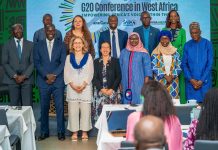By Dickens Okinyi
As the world prepares for the 30th United Nations Climate Change Conference (COP30) in Belém, Brazil, countries’ pledges to cut fossil fuels and boost renewables have not been fulfilled.
This is according to a new report by the Third Generation Environmentalism (E3G), a global climate change think tank. It focuses on tracking the energy commitments of countries’ nationally determined contributions (NDCs).
The report shows that updated national climate plans from 32 countries, covering 21% of global emissions, fall far short of what is needed to keep global warming below 1.5°C. The analysis reveals a big gap between promises and real action.
The tracker measures countries’ plans against the global energy goals agreed at COP28 in Dubai (2023), tripling renewable energy capacity by 2030, doubling energy efficiency by 2030, phasing down unabated coal, transitioning away from fossil fuels, and ending inefficient fossil fuel subsidies.
While almost all countries mention clean energy in their NDCs, none present a full strategy to meet these goals. Weak renewable targets, slow coal phase-outs, and a lack of financial support for developing nations threaten to derail progress.
“Countries are increasingly embedding global energy goals in domestic target setting, particularly on renewable energy and efficiency which is a positive signal for the global energy transition. But none have yet presented a comprehensive plan that aligns with the full set of COP28 energy outcomes,” said Jane Ellis, Senior Policy Advisor at E3G.
Coal remains the most polluting fossil fuel, and the International Energy Agency (IEA) has repeatedly stressed that phasing it out quickly is essential to meeting global climate goals. However, progress is slow.
According to the report, no country has provided a quantified target for winding down oil and gas production. Of the 32 countries that have submitted NDCs in this cycle so far, 17 produce oil or fossil gas. Of these 17, only two – Canada and the United Kingdom (UK) – included a mention of reducing oil and gas production.
“So far, we’re seeing a worrying lack of ambition on fossil fuel phase-down. Without firm commitments on coal and fossil fuel subsidies, countries risk locking in higher emissions and exposing communities to escalating climate impacts,” said Leo Roberts, Program Lead for Fossil Fuel Transition at E3G.
The biggest missing piece is finance. Developing countries, which suffer the worst impacts but pollute the least, need trillions of dollars to build clean energy systems. More than half of the new NDCs depend on international financial support, but rich nations like the U.S. and EU have not included strong funding promises.
“Over half of the new NDCs submitted to date, and a striking 80% from emerging markets and developing economies, contain targets conditional on international finance or support. Without stronger commitments from high-income countries, many of these pledges risk remaining only on paper,” said Dido Gompertz, Policy Advisor at E3G’s Global Clean Power Diplomacy team. Without money, poorer nations cannot expand renewable energy or adapt to climate change, deepening inequality and risking global cooperation at COP30.
The stakes are high. Weak climate plans mean more disasters, higher energy prices, and millions displaced. Strong plans, on the other hand, could create green jobs, boost economies, and mitigate climate change.
Major emitters like China, the EU, and the U.S. have not yet submitted their updated NDCs, leaving one last chance to align with the science. The 1.5°C target, the goal of limiting global warming to 1.5 degrees Celsius above pre-industrial levels, as agreed in the 2015 Paris Agreement, remains the benchmark for avoiding the worst climate impacts.
E3G stresses that the tracker is not just a scorecard, but a call to action. By pointing out the gaps, it shows governments what needs to change. For example, India has raised its renewable energy targets but still lacks a comprehensive plan for exiting coal. COP30 in Belém will be the real test. Will nations step up with ambitious, fair, and funded commitments, or will weak promises push the planet into a hotter, more dangerous future?






